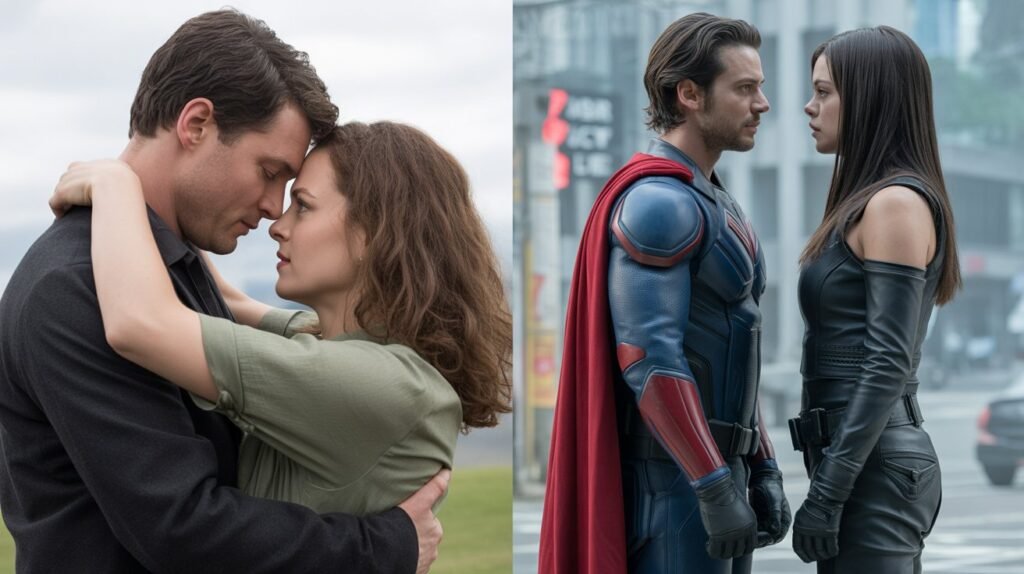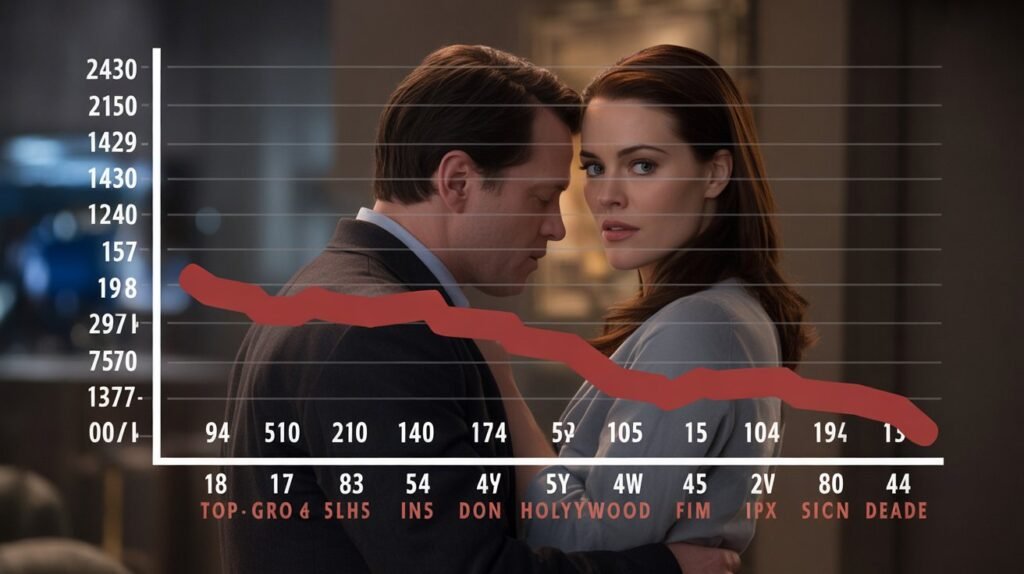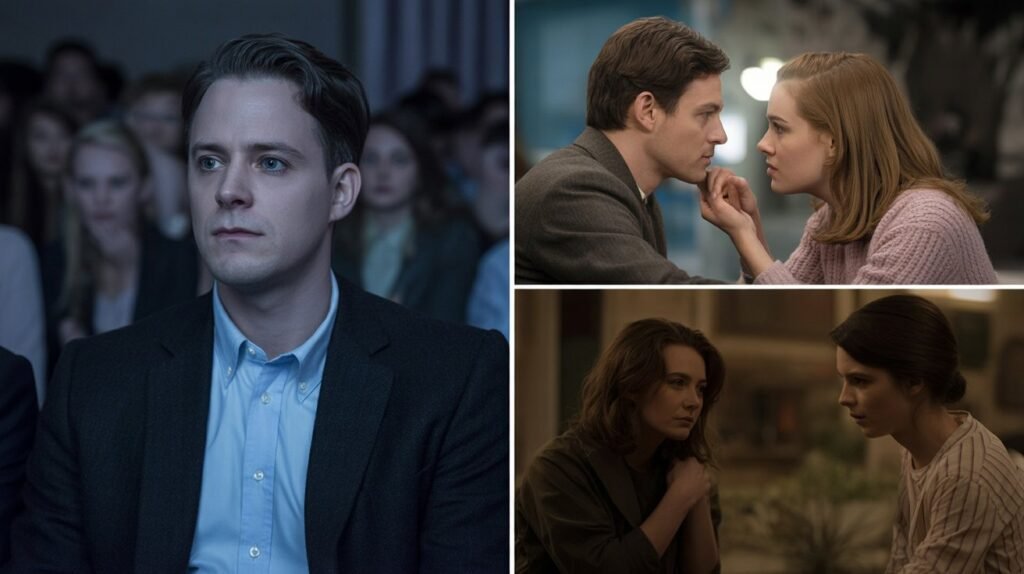Introduction: What ‘Deadpool & Wolverine’ Tells Us About Hollywood and Sex
The much-hyped release of Deadpool & Wolverine brought everything we’ve come to expect from modern superhero cinema: blood, banter, and bombastic action. What it didn’t bring—once again—was anything resembling real, raw sexuality.
In a culture where ultraviolence gets a standing ovation but honest intimacy gets cut from the script, this film unintentionally highlights a deep issue: Hollywood and sex remain in a tense, dysfunctional relationship. While heroes decapitate villains and crack crude jokes, their emotional and sexual lives stay curiously censored or cartoonish.
This imbalance says more about us than it does about Deadpool. And it’s a pattern that continues to shape audience expectations, storytelling limitations, and cultural attitudes around sexuality.

Hollywood and Sex: The Superhero Problem
Superhero films dominate the box office, but they’re emotionally sterile. Intimacy is usually suggested through smirks, strategic lighting, or a post-battle embrace—then quickly glossed over. For a genre so obsessed with physical perfection, Hollywood and sex remain miles apart in emotional or realistic representation.
Take Deadpool, a franchise that is supposedly boundary-breaking. The first film flirted with kink and emotional honesty, but the sequels, including Deadpool & Wolverine, lean harder into slapstick and away from mature romantic dynamics.
The contradiction is glaring:
- Graphic violence? Always welcome.
- Complex sexual intimacy? Almost taboo.
- Crude jokes about sex? Yes.
- Emotional consequences of sex? No.
This isn’t just a Marvel issue—it’s a Hollywood-wide symptom of discomfort with sex as something meaningful or humanizing.
Why Hollywood and Sex Stay Separate
Several factors keep Hollywood and sex from coexisting in a mature, nuanced way:
1. Fear of Alienating Mass Markets
Hollywood targets global audiences—including conservative territories where explicit sex scenes can mean bans or censorship. Studios avoid risk to protect revenue.
2. Cultural Hypocrisy Around Sexuality
In the U.S., violence is normalized in media while sex is heavily moralized. This leads to lopsided content where trauma is graphic, but love remains sanitized.
3. Ratings System Bias
The MPAA has a well-documented bias: sex, particularly female pleasure or LGBTQ+ intimacy, gets harsher ratings than violence. A tender same-sex kiss can push a movie from PG-13 to R faster than an explosion can.
4. Audience Conditioning
Years of sanitized storytelling have trained audiences to expect—and accept—emotional detachment in blockbusters. Many don’t even realize what’s missing.
The Consequences of Hollywood’s Avoidance of Sex
When Hollywood and sex stay disconnected, the audience suffers—not because we’re deprived of titillation, but because we’re denied truthful human storytelling. Real relationships involve physical connection, vulnerability, and emotional risk. Skipping these elements leads to:
- Flat romance arcs where characters lack believable chemistry
- Reduced representation of LGBTQ+ or non-conventional relationships
- Younger audiences developing skewed understandings of intimacy
- Mature viewers feeling alienated from content that ignores emotional depth
It’s no wonder men are leaving romantic storytelling behind—when all they see are action heroes who never communicate, feel, or connect in vulnerable ways.

What Indie and Foreign Films Get Right About Hollywood and Sex
Indie and international films don’t shy away from depicting sex as emotional, complex, or transformative. Films like Blue Is the Warmest Color, Call Me by Your Name, or Past Lives center physical intimacy as part of the character’s journey—not just a device for shock or seduction.
They understand that Hollywood and sex needn’t be oppositional. When done right, sexual storytelling builds empathy, tension, and catharsis. It makes characters feel more alive.
Compare that to Deadpool & Wolverine, where even suggestive moments are played for laughs, and romance is a subplot at best. It’s a missed opportunity to add dimension to already beloved characters.
Can Hollywood and Sex Ever Reconnect?
For Hollywood and sex to reconcile meaningfully, it needs to move away from shame and toward maturity. Here’s how:
| Action Step | Why It Matters |
|---|---|
| Hire intimacy coordinators | Ensures safety, consent, and authenticity on set |
| Diversify creative teams | More women, LGBTQ+, and POC behind the camera = richer stories |
| Challenge rating systems | Advocate for balance between sexual and violent content |
| Allow characters emotional depth | Intimacy should serve story, not distract from it |
| Educate audiences | Normalize sex as part of storytelling, not taboo |
Studios like A24 are already proving this can work—both artistically and financially. Mainstream Hollywood must catch up or risk becoming emotionally irrelevant.
Analysis: Why Men Are Leaving Emotional Intimacy in Film
There’s growing evidence that men are leaving emotionally resonant storytelling behind—because they rarely see themselves portrayed as emotionally or sexually expressive. Hollywood reinforces this with emotionally muted male leads who fight but don’t feel.
Films that sideline intimacy unintentionally teach that:
- Vulnerability is weakness
- Sex is comedic or dangerous
- Desire must be hidden or punished
This conditioning affects how men show up in relationships, how they internalize their value, and how they understand connection. Restoring realism to sex on screen may also restore balance to male emotional development.

Conclusion: Hollywood and Sex Deserve a Second Chance
Deadpool & Wolverine is just the latest example of how Hollywood avoids real sex while doubling down on action. But the cost is high. When films refuse to show healthy intimacy, they rob us of truth, vulnerability, and complexity.
To evolve, Hollywood must confront its discomfort, abandon moral double standards, and reclaim sexuality as a meaningful part of human storytelling—not just a joke or a scandal.
Audiences are ready. Artists are willing. Now it’s up to the studios to finally let Hollywood and sex make peace.
Reference Links
- How Sexual Repression Is Killing American Dating
- What Women Want Sexually vs. What Really Happens
- MPAA Rating Bias Report – Film Ratings Research
- Hollywood Reporter – Intimacy Coordinators Transforming Film
Have you noticed the emotional void in today’s blockbusters?
Do you think Hollywood and sex can ever coexist with emotional honesty?
👉 Leave a comment below, share this article, or explore more of our content on media, relationships, and emotional culture.
📬 Want more thoughtful commentary on sex, film, and society? Subscribe to our newsletter for updates, insights, and exclusive interviews.

